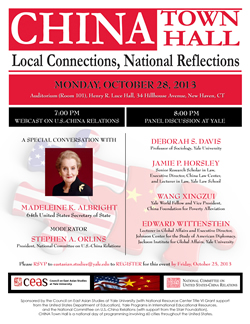On October 28, the Council on East Asian Studies hosted the seventh annual CHINA Town Hall, organized by the National Committee on U.S.–China Relations, featuring a special webcast conversation with Madeleine K. Albright (64th United States Secretary of State) followed by a local panel discussion with China experts at Yale. Deborah S. Davis (Professor of Sociology, Yale University) moderated the panel, which covered issues of concern ranging from food safety to foreign aid, from the rhetoric of leadership to changing demographics in China, and from the recent U.S.-China joint naval exercise to China’s domestic terrorism. Davis was joined by three panelists: Jamie P. Horsley (Senior Research Scholar in Law; Executive Director, China Law Center; Lecturer in Law, Yale Law School); Xingzui Wang (Yale World Fellow; Vice President, China Foundation for Poverty Alleviation); and Edward Wittenstein (Lecturer in Global Affairs and Executive Director, Johnson Center for the Study of American Diplomacy, Jackson Institute for Global Affairs, Yale University).
 The panel focused on creating a dialogue with the audience, and began by examining some of China’s recent struggles. Following an audience member’s comment about the nostalgia that exists around former leaders, especially Mao Zedong, Davis addressed the balance that new leaders, like Xi Jinping, must strike between invoking their predecessors and establishing their own representative “theory” to stand behind. Wang spoke about the development of NGOs in China in the 1980s following the reforms of Deng Xiaoping, and also about the current tensions in Xinjiang between the central government and Uyghurs. Wittenstein talked about incidents of cyber-spying and the economic benefits that state-run enterprises can reap with currently relaxed policies on intellectual property in China. Horsley shared her knowledge of pollution problems and China’s frequent regulatory issues with food safety, and the concern that involved companies have over their reputation rather than the fear of paying compensatory fines. The panel also discussed the increasingly multifaceted relationship that China has, not only with the U.S., but with other countries as well. Due to changing energy initiatives, China is increasingly dependent on the Middle East for oil, while the U.S. has a different set of interests, as it no longer relies as much on oil from the Middle East. The complexity of multilateral relationships was also evident following the recent joint naval exercise between China and the U.S., with both countries having very different relationships with Japan.
The panel focused on creating a dialogue with the audience, and began by examining some of China’s recent struggles. Following an audience member’s comment about the nostalgia that exists around former leaders, especially Mao Zedong, Davis addressed the balance that new leaders, like Xi Jinping, must strike between invoking their predecessors and establishing their own representative “theory” to stand behind. Wang spoke about the development of NGOs in China in the 1980s following the reforms of Deng Xiaoping, and also about the current tensions in Xinjiang between the central government and Uyghurs. Wittenstein talked about incidents of cyber-spying and the economic benefits that state-run enterprises can reap with currently relaxed policies on intellectual property in China. Horsley shared her knowledge of pollution problems and China’s frequent regulatory issues with food safety, and the concern that involved companies have over their reputation rather than the fear of paying compensatory fines. The panel also discussed the increasingly multifaceted relationship that China has, not only with the U.S., but with other countries as well. Due to changing energy initiatives, China is increasingly dependent on the Middle East for oil, while the U.S. has a different set of interests, as it no longer relies as much on oil from the Middle East. The complexity of multilateral relationships was also evident following the recent joint naval exercise between China and the U.S., with both countries having very different relationships with Japan.
In the end, the discussion turned toward the different exchange initiatives between China and the U.S., including the “100,000 Strong Educational Exchange Initiatives” led by President Obama, in comparison to the over 200,000 Chinese students who studied in the U.S. this past academic year. While academic exchange has been encouraged, the discrepancy in understanding at the highest governmental echelons in both countries was raised as an area of concern, and the conversation ended with how the U.S. and China must continue to work toward a better understanding of one another in order to improve relations.
The event was sponsored by the Council on East Asian Studies at Yale University (with support from a Title VI National Resource Center Grant from the U.S. Department of Education), Yale Programs in International Educational Resources, and the National Committee on U.S.-China Relations (with support from the Starr Foundation). CHINA Town Hall is a national day of programming involving 60 cities throughout the United States.
